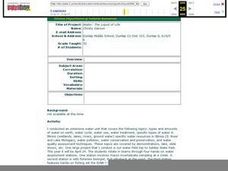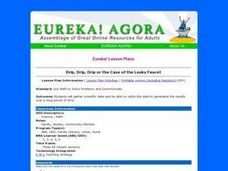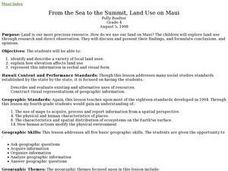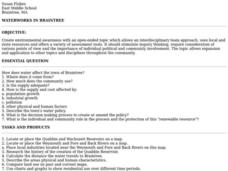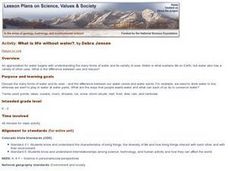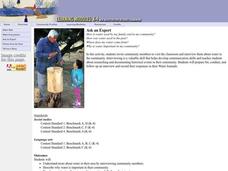Curated OER
How Much CO2 Gas Can Sea Water Hold?
Students explain the relationship between water temperature and gas concentration. Using a graph, they describe how sea surface temperature changes along with the seasons. They develop a hypothesis and test it by graphing and analyzing...
Curated OER
The Path of Water
Third graders discuss the sources of water, the path it takes to get to homes and businesses, and the ways we use water. Students begin by expanding their awareness of the hydrosphere as they research the water cycle, the sources of our...
Curated OER
When Land Ice Melts
Students investigate what happens when land ice melts. They discuss how the melting of land ice is different than the melting of icebergs. Students observe what happens as the ice melts.
Curated OER
Let it Grow and See What Happens
Pupils participate in an experiment in which they try to stop algae from growing. In groups, they develop a hypothesis and test it while making changes to the experiment along the way. They make observations and organize their data to...
Curated OER
Rain Drops
Students examine drops of water on several materials used on the outside of buildings. They make selective observations on and compare plastic, wood, brick, metal, roof tiles and glass.
Curated OER
Water: The Liquid of Life
Sixth graders complete a lesson on the properties, types and amounts of water on Earth. In groups, they travel between stations to identify water resources in Illinois and pollution sources. They complete the lesson with a field trip...
Curated OER
Drip, Drip, Drip
Students gather scientific data and be able to utilize the data to generalize results over a long period of time. They use the appropriate tools to measure quanities of liquids and analyze the data to determine the cost of a leaky faucet.
Curated OER
Water,It's Special
Students describe the three forms of water. Students list reasons why water is necessary. Students access the Internet to complete Prediction lab report worksheets and FCAT-Style Questions worksheets.
Curated OER
Contaminated Water
Students review and use the steps in the scientific method to complete the experiment. In groups, they research the importance of water to plants and animals in their local area. They examine how water can become contaminated and take...
Curated OER
Investigate Factors Affecting Nitrates in Groundwater
Students participate in an experiment in which they investigate the factors affecting the levels of nitrates in groundwater. Using examples, they explain the nitrogen cycle and identify the sources of chemical nitrogen fertilizers. ...
Curated OER
From the Sea to the Summit, Land Use on Maui
Fourth graders examine the how the land is used on the islands of Hawaii. Using this information, they discover how elevation affects how the land is used and represent this data in a visual form. They describe existing and alternative...
Curated OER
Waterworks In Braintree
Middle schoolers examine how water affects the community of Braintree. Using a map, they locate main resevoirs and rivers in the area and research the history of one of the resevoirs. They use charts and graphs to show how land use has...
Curated OER
What is Life Without Water?
Students differentiate between how they use water in response to a need and how they use water for pleasure. They read books about water, participate in class discussion and illustrate their observations.
Curated OER
Fresh or Salty?
Students explore water bodies on the planet Earth and their various uses and qualities. They examine several ways that engineers are working to maintain and conserve water sources and think about their role in water conservation....
Curated OER
Changing the Water in the Aquarium
Students discover the importance and how to change the water in an aquarium. As a class, they review the types of impurities that are found in water and discuss how to keep the tank as clean as possible. They develop a water change...
Curated OER
Fish Around the World
Students use a globe to answer questions such as which continent they live in and the country in which they live. They identify at least two bodies of water near their state and two foreign countries. In groups, they complete a...
Curated OER
Do You See What I See?
Students hypothesize the role of rocks, soil, and water by observing a terrarium and create a model to explore the water cycle. This is part of a five station set up.
Curated OER
Ways We Use Water
Fourth graders write a persuasive paper after a demonstration about the properties of water and how they work. The lesson also uses a mind map to outline the paper.
Curated OER
Photos from the Past-Grades 5-8
Students examine and interpret historic photographs of water use in New Mexico. They match captions to the pictures as to what they think the picture depicts. They research a topic represented by their photograph and write an extended...
Curated OER
Ask An Expert
Students invite community members to visit the classroom and interview them about water in the community. Students prepare for, conduct, and follow up an interview and record their responses in their Water Journals.
Curated OER
Charting Our Waters
Students create an attribute chart to organize their learning about water. They work with a partner to incorporate academic vocabulary to complete their chart. Students may volunteer to share their charts with the entire class.
Curated OER
How Much Water Will The Desert Hold?
Students examine the characteristics of the desert environment. They experiment with a container which they fill with sand and measure the amount of water that can be absorbed in the container. They compare this with the conditions in...
Curated OER
Devising a Set of Experiments to Test Water for Dissolved Substances
High schoolers work together to test water samples for pollutants. They design data tables to collect and record their observations. They complete discussion questions to end the instructional activity.
Curated OER
Water Quality Monitoring
Students work together to gather water samples. They compare and contrast the water quality from different places in the community. They answer discussion questions to complete the lesson.







